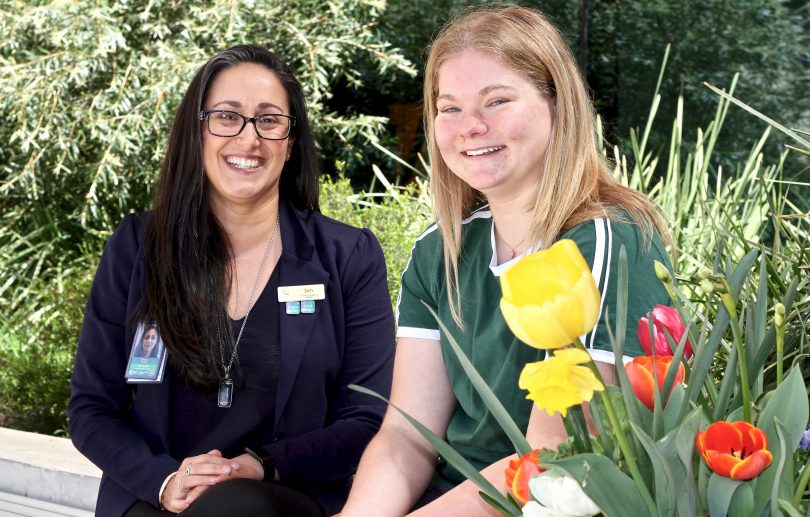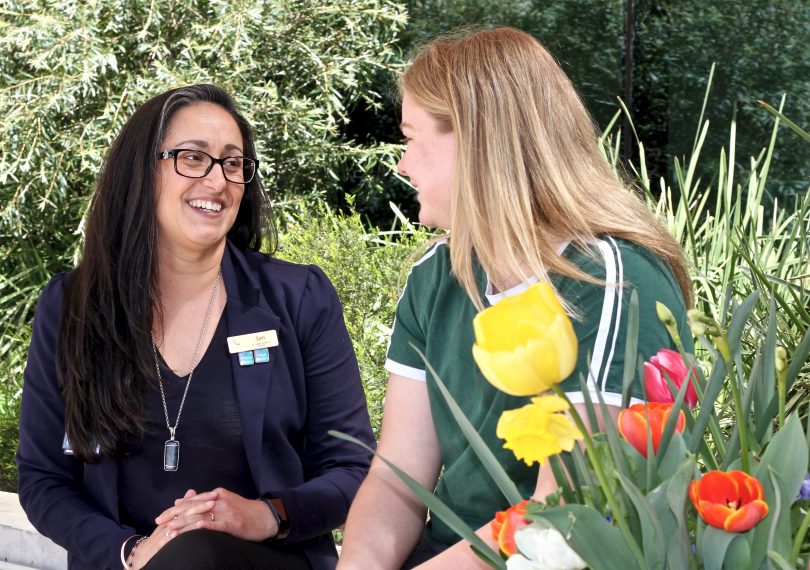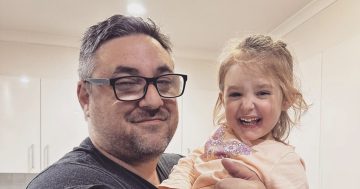
Simone Collins (left), a diabetes social worker at Canberra Hospital, and type 1 diabetic Ellen Brown (right). Photo: Michael Weaver.
The insulin pump attached to Ellen Brown’s hip is one piece of technology that will always take priority over her mobile phone.
As a type 1 diabetic (T1D), the pump keeps her blood glucose levels in check but also allows Ellen the freedom to live with the condition. The pump is by no means a fashion statement for the 18-year-old, but it does provide a dose of the reality of living with T1D as a teenager.
That’s where diabetes social worker Simone Collins steps in to help navigate the daily regime of insulin injections and continuous blood glucose monitoring among Ellen’s schedule of school, part-time jobs, parents, friends, fashion and the occasional acne outbreak.
Simone is Canberra’s link to a national forum that tackles the hard questions about living with T1D.
She talks about what she calls “the hard stuff” – alcohol, sex, hormones and how increased anxiety from the COVID-19 pandemic can affect the rise and fall of blood glucose levels.
“We received questions that were really hard hitting,” Simone tells Region Media. “They were about weight and what to do when you just don’t want diabetes anymore. What if you don’t want to tell your friends you have diabetes or don’t want to talk to your parents about certain things?”

“I’m really open with my friends about having diabetes,” says Ellen Brown, right, with Canberra Hospital diabetes social worker Simone Collins (left). Photo: Michael Weaver.
However, Ellen is a typical teenager who is not the type to shy away from the fact she also has type one diabetes, an autoimmune disease that she was diagnosed with 10 years ago.
Now in the last term of her final year of school, Ellen is eyeing a profession in physical education or exercise physiology.
“Anything to do with sport or exercise,” she says.
“I’m really open with my friends about having diabetes. They see me testing my blood sugar levels at things such as soccer training and they try to guess what my level will be to see who is closest to it.
“I don’t really stress about it and I focus on the positives of living with diabetes. You’re not going to get it right every day so it’s a matter of learning what I can do.”
Simone says there is a healthy dose of people with good intentions who like to give advice about how not to ‘catch’ diabetes, and this often adds to the anxiety a diabetic faces.
“As a teenager, you are completely exposed to people giving unsolicited advice, such as your great aunt with type 2 diabetes, or the classic ‘if you didn’t eat so much sugar you wouldn’t have diabetes’, or ‘if you exercised more, you wouldn’t get diabetes’,” she says.
“The road to diabetes is paved with good intentions, and these guys are trying to be so upbeat and positive about having such a complex condition, but then they have to deal with teachers’ opinions, employers’ opinions and family members.
“Young people can end up spending so much time with this misplaced guilt and sadness around diabetes so we need to separate the fact that these young people were, at some point in their lives, going to be diagnosed with diabetes.”
Simone has also been collaborating with the Juvenile Diabetes Research Foundation and co-authors the JDRF Australia Facebook blog that focuses on emerging out of the COVID-19 cocoon after diagnosis.
Her work is helping shape an Australia-wide approach to greater support for diabetics, along with research into the social aspects of children and adolescents living with a chronic condition.
“We often talk to young people about how their emotions will impact their glucose levels,” says Simone. “There might be an exam you really want to pass, or something is happening in your family situation that is really distressing, so the conversation for a lot of young people with their parents is around what you are eating or when did you last have your insulin.”
For Ellen, life with T1D is her new normal.
“It’s part of my daily routine,” she says. “I wake up and test my blood sugars, but each day with diabetes is different. I can’t remember what life was like without diabetes.”













